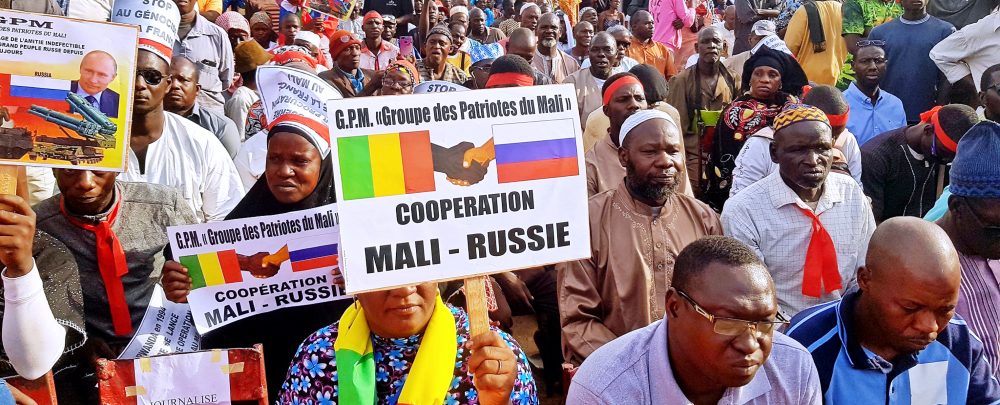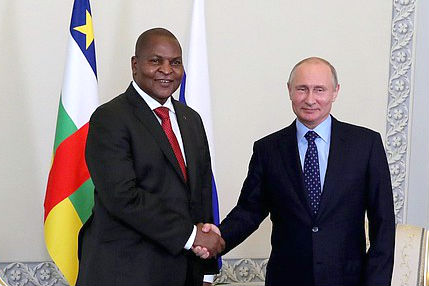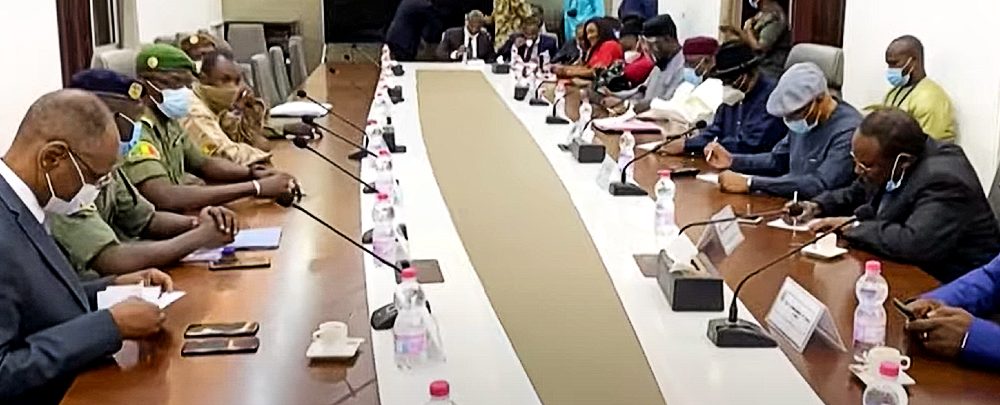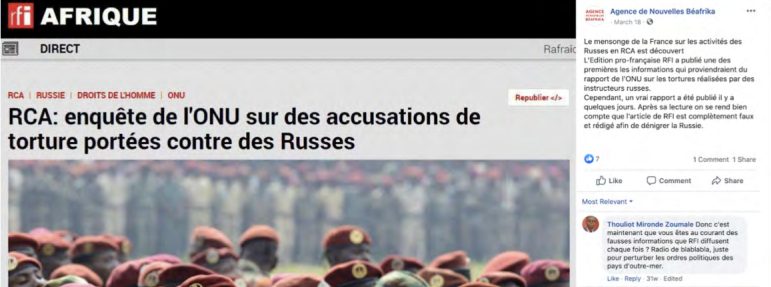
A 2019 rally organized by pro-Russia Groupe des Patriotes du Mali. (Photo: GPM)
Reports that Mali’s military junta has negotiated a prospective deal to bring in 1,000 Russian mercenaries from the notorious Wagner Group are anything but surprising.
Russia has been trying to expand its influence in Mali for the past several years. Disinformation campaigns first seen in 2019 were instrumental in stirring up the protests that toppled democratically elected president Ibrahim Boubacar Keïta in August 2020.
“Moscow has followed a pattern of parachuting in to prop up politically isolated leaders facing crises in regionally pivotal countries, often with abundant natural resources.”
In addition to maligning Keïta, the messages from these campaigns were anti-French, disparaging of democracy, and pro-Russian. Curiously, dozens of people who came onto the streets following the coup were waving Russian flag placards. Several of the coup leaders, moreover, had just returned from an extended security assistance training in Moscow. And the Russian Ambassador in Mali, Igor Gromyko, was one of the first foreign officials to be received by the junta. So, the prospective deal with Wagner can be seen as a continuation of this sequence.
With coup leader Colonel Assimi Goïta at the helm, Mali has been especially ripe for the picking as part of Russia’s asymmetric influence campaign in Africa. Borrowing from its Syria playbook, Moscow has followed a pattern of parachuting in to prop up politically isolated leaders facing crises in regionally pivotal countries, often with abundant natural resources. These leaders are then indebted to Russia who assumes the role of regional powerbroker.
This elite cooption sequence is facilitated when it involves an autocratic leader who lacks other checks and balances. In the case of Goïta, who has mounted two coups and consistently ignored ECOWAS’ stipulations on the transition, he’s not even beholden to a constitution.
The essence of the prospective Wagner deal, then, is an unaccountable junta leader vying to bring in unaccountable mercenaries. It’s not hard to imagine how this could turn out badly.
A Roadmap to Ruin: CAR

CAR President Faustin Archange Touadera and Russian President Vladimir Putin
(Photo: kremlin.ru)
The experience of the Central African Republic (CAR) provides a roadmap. President Faustin-Archange Touadéra welcomed 400 Wagner “instructors” in 2018 ostensibly to help fend off a collection of rebel groups. Wagner struck a deal with some of the rebels to secure diamond mines in the north of the country. (These have subsequently been incorporated into Wagner’s illicit trafficking network linking western Sudan, CAR, and the East Africa coast).
As part of the arrangement, Touadéra appointed a Russian as his National Security Advisor and Wagner serves as his presidential guard. CAR officials who have raised concerns over Russia’s undue influence have been replaced.
Intent on keeping their ally in office, Russia unashamedly supported Touadéra’s controversial reelection in December 2020. Wagner troops in CAR, now estimated to be around 2,300, have been accused by the United Nations of human rights abuses including extrajudicial killings, attacks on civilians, torture, and rape.
While instability has not been addressed by Wagner, CAR’s sovereignty has been compromised. This is what’s at stake in Mali if Wagner comes in, reportedly at the expense of $11 million per month to the Malian taxpayer.
Who Benefits?
“Neither Goïta nor Russia will have any incentive to move forward with the agreed-to transition.”
Meanwhile, Russia gains a foothold in a part of the continent where it has not had much of a presence historically. Comprised of ex-Russian defense intelligence troops, Wagner is not a private military contractor so much as an under-the-radar coercive tool that Moscow has used to expand its influence in Africa (and other parts of the world). While justified on security grounds, it is regime not citizen security that Wagner is there to support.
By being Moscow’s man in Mali, Goïta gains a foreign security force that will help him consolidate his hold on power. He has extolled the role of military government since coming on the scene, despite Mali’s appalling and lengthy track record under military leaders. He also secures a prominent external backer with a seat at the UN Security Council. Once such an arrangement is in place, neither Goïta nor Russia will have any incentive to move forward with the agreed-to transition to democratic, civilian rule.
What happens with the Wagner deal, therefore, is a make-or-break moment for Mali and its prospects of returning to democratic rule.
What Should be Done
The Economic Community of West African States (Ecowas) has a central role to play in blocking the Wagner deal. Allowing Wagner into Mali would have profound long-term implications for Mali’s sovereignty, security, governance, and foreign policy—with repercussions for the broader region. Given that Goïta’s only claim to authority is that he seized power extra-constitutionally, it should not be up to him to take Mali down this slippery slope.
As the guarantor of the transition in Mali, Ecowas must make clear that Goïta’s primary role is to facilitate a transition and, as such, any deals with foreign actors, especially one with such a sinister track record, should wait until there is an elected, democratic government in place.

Mali coup leaders meeting with ECOWAS officials in August 2020. (Image: VOA)
Should Goïta resist Ecowas’s direction, the regional body should declare Goïta in violation of the agreed transition protocol. He and other members of the junta should then be sanctioned and recognition of their role as transitional leaders be revoked. Recent warnings by Ecowas that the Mali transition stay on track for the February 2022 elections and that anyone deemed to be hindering these preparations will face sanctions is a positive step.
Ecowas will need to be backed up, though. The international democratic community should also be prepared to deny the coup leaders access to the sovereign accounts of the state of Mali. This would underscore the reality that the junta is reliant on international recognition for its continuity.
“Given that Goïta’s only claim to authority is that he seized power extra-constitutionally, it should not be up to him to take Mali down this slippery slope.”
Ecowas and the African Union can furthermore invoke the African Convention for the Elimination of Mercenarism, which went into effect in 1985, prohibiting states from allowing mercenaries into their territories. Declaring Wagner a mercenary force identifies them, appropriately, as an illegal entity, one that should be prohibited from operating in Mali (or other parts of Africa).
France, Germany, and other European countries have rightly signaled to the junta that there would be costs in security and economic support should they attempt to move forward with the Wagner deal. European actors must be careful, though, that any potential withdrawal from Mali does not create an even bigger vacuum for Russia to fill. Displacing the West, after all, is a key dimension of Russia’s geostrategic interest in Mali.
Since security remains an overriding concern in Mali, international partners should be prepared to expand their security support in Mali on the condition of continued movement toward a democratic transition. Stabilizing Mali, of course, is about much more than firepower. It requires sustaining an accountable security and governance presence in contested areas so as to rebuild trust with local communities.
Pro-democracy and civil society actors also need to raise awareness of the grave accountability and sovereignty risks of allowing Wagner into Mali. Malians are understandably fatigued by the ongoing instability and may be tempted by the mirage of 1,000 mercenaries bringing stability. Unfortunately, stability is not what Wagner has delivered—in Libya, CAR, Mozambique, or Ukraine.

Screenshot of a Russian-run Facebook account criticizing reports of Wagner’s human rights abuses in CAR.
(Image: Stanford)
In Mali’s ongoing context of extra-constitutionality, popular sentiment will be a vital factor in shaping expectations on a timely transition to a democratic government. Pro-Russian information platforms in Mali have already begun to tout the deal.
Mali is vulnerable to having its sovereignty bartered away to a foreign power because it has a serial coup leader playing the role of head of state. In practical terms this means Mali is at the mercy of the whims of a single unelected individual rather than a system of laws or a reasoned consideration of its national interests. The lack of seriousness with which the junta has prepared for a transition to a civilian government further reveals the naivete of entrusting a political transition to military actors with a vested interest in holding onto power.
This mistake should not be magnified by allowing Wagner to get a foothold in Mali.
This article first appeared on AllAfrica.com.
More on: Governance Mali Russia Sahel

